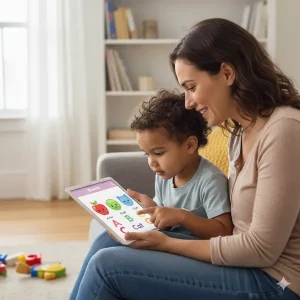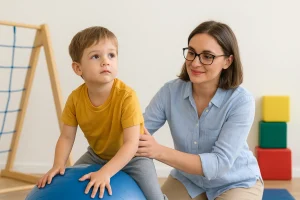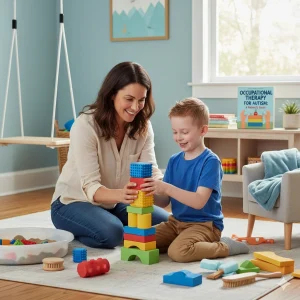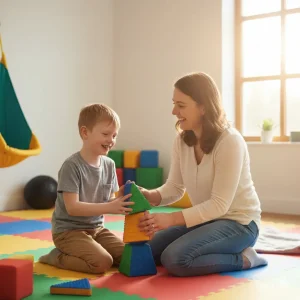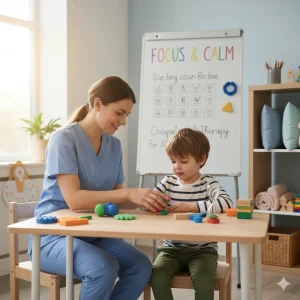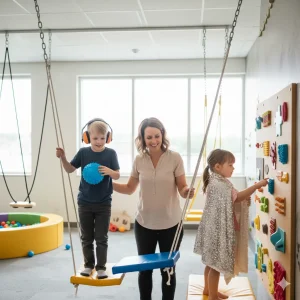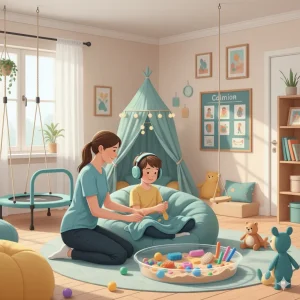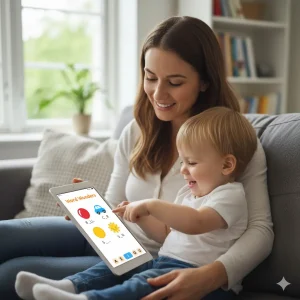Is It Normal If My 3-Year-Old Mixes Up Words and Tenses?
By Rajini D
Last Updated: August 11, 2025
As a parent, hearing your 3-year-old mix up words and tenses can raise a few eyebrows. Is this a sign of a developmental delay? Or is it just part of the normal process of learning language? If you’ve ever wondered whether your toddler’s grammar mistakes are a cause for concern, you’re not alone. Many parents worry when their little ones say things like “I goed to the park” or “I runned fast.”
Rest assured, these errors are completely normal in early childhood language development. In fact, mixing up words and tenses is a natural part of mastering language at this age. But when should you be concerned? In this article, we’ll explore why your 3-year-old may be making these mistakes, what typical language milestones to expect, and when to seek professional advice if necessary.
Free Speech Help for Kids
Concerned about speech delays? Book a free consultation with our expert speech therapist and get guidance tailored to your child’s needs.
Understanding Toddler Language Development: What’s Normal at Age 3?
When your toddler turns three, you’re bound to notice big changes in their language development. At this age, children start making significant strides in their ability to communicate, but that doesn’t always mean they’re speaking perfectly. In fact, it’s totally normal for a 3-year-old to still be working through the finer details of grammar and sentence structure. Toddler speech development is a gradual process, and 3-year-olds are just beginning to refine their language skills.
So, what should you expect when it comes to children’s language acquisition at age 3? Let’s break it down!
Typical Language Milestones for 3-Year-Olds
By the time your child is three, they’re likely to hit several key child language milestones that signal they’re on the right track. At this stage, they’re transitioning from the “baby talk” of earlier years to more structured and meaningful sentences. Here are some key milestones:
- Sentence Formation
Around this time, toddlers start to form simple three-to-four-word sentences. For example, they might say, “I want juice” or “Mommy, help me.” These sentences may still lack some grammatical accuracy, but they’re getting the hang of putting words together to express needs and thoughts. - Verb Usage
Verb usage becomes more consistent at age 3, but it’s still common for children to make errors, like saying “I goed to the park” instead of “I went to the park.” The overuse of past tense forms (like adding “-ed” to irregular verbs) is part of normal development, and it’s something most children will outgrow by age 4 or 5. - Increasing Vocabulary
By age 3, toddlers typically know between 200-1,000 words. They begin to use more specific nouns (like “dog” or “truck”) and start incorporating adjectives (e.g., “big ball,” “red car”). This vocabulary explosion supports their ability to express themselves more clearly and understand the world around them. - Question Formation
You might hear your toddler start to ask simple questions like “What’s that?” or “Where’s mommy?” These questions reflect their growing curiosity about the world and their desire to understand cause and effect. - Pronunciation and Sound Development
While your toddler’s pronunciation might not always be spot-on, they will likely start making clearer distinctions between similar sounds. For instance, “cat” and “bat” will sound more distinct as they approach age 4.
Common Language Skills at Age 3
At age 3, toddlers may still make plenty of language errors, and that’s completely normal! They are experimenting with grammar and sentence structure, so mistakes like mixing up verb tenses are typical. For example, they might say, “I eated lunch” instead of “I ate lunch,” or “I will went to the store.” These grammar mistakes are common as toddlers work through the rules of language, especially with more complicated verbs.
Sentence Structure at this age can also be a bit inconsistent. Your toddler may be able to form a sentence, but it might be missing a word or two, such as “I want cookie” instead of “I want a cookie.” Additionally, toddlers may still struggle with the correct order of words in more complex sentences.
Another common occurrence is the use of telegraphic speech, where toddlers leave out less critical words (like articles or auxiliary verbs) to simplify sentences. For example, they might say, “Mommy go store” instead of “Mommy is going to the store.” While it might seem like a mistake, this is just a natural part of their development as they focus on the most important words.
Why Do Some 3-Year-Olds Mix Up Verb Tenses?
It’s important to understand that mixing up verb tenses is a normal stage of toddler speech development. At age 3, children are beginning to understand that past, present, and future events all have different ways of being expressed. However, this understanding is still developing, and as a result, they might apply rules inconsistently.
For example, they may overgeneralize rules they’ve learned about verb tense, applying the “-ed” suffix to irregular verbs (e.g., “I ranned” instead of “I ran”). These errors are a sign of language experimentation and growth, not something to worry about. As they continue to hear and practice more language, they will gradually get the hang of using tenses correctly.
Supporting Your Toddler’s Language Development
As your 3-year-old navigates the complex world of grammar and sentence structure, it’s essential to provide plenty of opportunities for practice. Encourage dialogue and keep reading together to help them grasp more complex sentence forms. And remember, correction should be gentle – simply model the correct form of the sentence and give them time to absorb the changes.
In conclusion, language development in 3-year-olds is full of fascinating milestones and growth. While mistakes like mixing up words and tenses are normal, they are a clear sign that your child is actively learning how to communicate with the world around them. Embrace these moments and continue to support their blossoming communication skills!
Also read: Language Development: Stages, Tips, and Common Challenges
Common Language Errors in 3-Year-Olds
When it comes to 3-year-old language development, it’s not uncommon for toddlers to make a variety of language errors as they learn to communicate. These mistakes, though seemingly small, are actually a natural part of the language learning process and are often a sign that your child is experimenting and figuring out the rules of language. Among the most common mistakes you’ll likely notice are verb tense errors, overgeneralization in child speech, and toddler grammar mistakes.
But what do these errors actually look like, and why are they so common in young children? Let’s dive into some of the most typical language errors at this age and explore why they happen.
1. Verb Tense Errors in Toddlers
One of the most frequent language mistakes in 3-year-olds is verb tense errors. As children begin to understand how tenses work, they often mix up past, present, and future forms, especially when they’re just starting to grasp the concept of time. You might hear phrases like:
- “I goed to the park” instead of “I went to the park”
- “I runned fast” instead of “I ran fast”
- “I seen a dog” instead of “I saw a dog”
These past tense errors in 3-year-olds are completely normal and typically happen as toddlers try to apply what they’ve learned about verb forms in their speech. Many kids tend to overuse the “-ed” suffix to form the past tense, even for irregular verbs that don’t follow this pattern. For example, while “run” becomes “ran,” children might apply the general rule and say “runned” instead.
2. Overgeneralization in Child Speech
Another common language error toddlers make is overgeneralization. This happens when children apply a rule they’ve learned too broadly, without realizing that some words don’t fit the pattern. This often leads to toddler grammar mistakes like:
- Saying “goed” instead of “went” (overgeneralizing the “-ed” rule)
- Using “mouses” instead of “mice”
- Saying “comed” instead of “came”
Overgeneralization occurs because, as children learn grammar, they are trying to make sense of complex rules. When they come across a rule that works for many words (like adding “-ed” to make a word past tense), they naturally apply it to words that don’t fit the pattern. For example, once they’ve learned that “walk” becomes “walked,” they’ll apply the same logic to “run,” resulting in “runned.”
While these errors might sound odd, they are a normal part of language development. Over time, with more exposure to correct language usage, toddlers will start to realize which words don’t follow the general rules and will begin using them correctly.
3. Misused Pronouns and Sentence Structure
At this age, toddlers are also refining their sentence structure and understanding of pronouns. It’s common to hear them say things like:
- “Him want to play” instead of “He wants to play”
- “Me can do it” instead of “I can do it”
These misused pronouns are another part of the learning process. In many cases, children start by using simplified versions of pronouns before they fully grasp the distinctions between “I,” “me,” “he,” “she,” and “they.” This is an important developmental step, as they move from more simplistic language patterns to more accurate ones.
Why Are These Errors Normal?
It can be easy to worry when you hear your child making verb tense errors in toddlers or other language mistakes, but it’s essential to remember that these errors are a natural part of language learning. Here’s why:
- Experimentation: At this stage, toddlers are still experimenting with language. They’re figuring out the rules and testing them out as they go. Language acquisition is a complex process, and making mistakes is a sign that they’re actively engaged in learning.
- Cognitive Development: Children at this age are still developing their cognitive abilities and their understanding of concepts like time, causality, and relationships between words. This explains why verb tense errors occur – they simply haven’t fully mastered the concept of tense yet.
- Overgeneralization of Rules: The overgeneralization of language rules is actually an excellent sign of cognitive growth. It shows that toddlers are beginning to recognize patterns in language, which is a crucial step in their overall language development.
- Gradual Refinement: As children continue to be exposed to language – through conversations with parents, caregivers, and other children – they will gradually refine their use of grammar. Over time, the mistakes they make at age 3 will become less frequent and more accurate.
When Should You Be Concerned?
While toddler grammar mistakes are a normal part of development, it’s important to be aware of your child’s progress. Most of these errors, including verb tense mistakes and overgeneralization, should diminish as your child approaches age 4 or 5. However, if you notice persistent speech issues or your child is falling behind on typical language milestones, it’s worth consulting a speech-language pathologist to rule out any potential speech delays or language disorders.
Supporting Your Toddler’s Language Growth
Instead of correcting every little mistake, it’s more effective to model the correct language for your child. For instance, if your toddler says “I goed to the park,” you might reply, “Oh, you went to the park? That sounds like fun!” This subtle approach helps them learn without discouraging their communication efforts. Additionally, engaging in activities like reading together and having conversations will give your child ample opportunity to hear and practice proper language usage.
When Do Toddlers Typically Master Verb Tenses?
As parents, it’s common to notice that your toddler’s language development comes with some fascinating, albeit imperfect, stages. One of the most noticeable aspects of early language development is how children learn to use verb tenses correctly. At age 3, past tense errors in 3-year-olds are not unusual, but when should you expect your child to start using correct verb tenses consistently? Understanding the timeline for mastering verb tenses and other grammar rules will help you feel more confident in supporting your child’s language acquisition journey.
The Typical Timeline for Mastering Verb Tenses
Language development doesn’t happen overnight, and mastering verb tenses is no exception. Here’s a general timeline of how toddlers begin to use correct verb tenses:
| Age Range | Development Milestones |
|---|---|
| Ages 2 to 3 | Early Mistakes and Exploration: Toddlers start using simple phrases like “want cookie” and “go park.” They may often make verb tense errors, like saying “I goed” instead of “I went,” as they experiment with language rules. |
| Ages 3 to 4 | Overgeneralization and Awareness of Tense: At age 3, children begin using past tense more often but still make many mistakes, such as “I runned” instead of “I ran.” They are learning to understand different verb forms. |
| Ages 4 to 5 | More Accurate Use of Tenses: By age 4, children use past tense more consistently and correctly, saying “ate” and “went” instead of “eated” and “goed.” A few irregular verb mistakes may remain until closer to age 5. |
| Ages 5 and Beyond | Mastery and Refinement: By age 5, most children can use past and present tenses accurately. Errors with future tenses or less common irregular verbs become rare as their grammar skills improve. |
How Language Acquisition Varies Among Children
Language acquisition varies greatly among children. While most follow a similar timeline, the exact age at which they master language skills, such as verb tenses, can differ. Several factors can affect this, including:
- Personality: Some children are more naturally talkative, while others are quieter.
- Environment: Rich language environments with lots of reading and conversation help speed up learning.
- Exposure to Language: Children exposed to more verbal interaction typically master language skills faster.
- Cultural Influences: Cultural norms and expectations can influence language learning.
Developmental Differences
Some children may master verb tenses earlier, especially if they are in an environment rich with conversation and reading. Others may take a little longer, particularly if their focus is more on social-emotional skills than language.
Siblings’ Impact
First-born children often master language skills earlier due to more one-on-one time with adults. However, second-born children may develop at a different pace, benefiting from the conversational exposure to older siblings.
When Should Parents Be Concerned About Verb Tense Errors?
While verb tense errors are common in 3-year-olds, it’s important for parents to track their child’s overall language development. Most toddlers will make mistakes as they learn, but if your child isn’t using verb tenses correctly by age 4 or 5, it may be a sign to seek help. Additional concerns include:
- Limited Vocabulary Growth
- Difficulty Forming Sentences
- Trouble Understanding Simple Instructions
These could indicate a language delay or a developmental issue.
Some children may have difficulty with verb tenses and other grammar rules due to conditions like apraxia of speech or dyslexia. Early intervention is key, so if you’re concerned, it’s a good idea to consult a pediatrician or a speech-language pathologist to assess your child’s progress and determine next steps.
Supporting Your Child’s Language Development
As your toddler works on mastering verb tenses and other aspects of language development, here are a few tips to support them:
- Model Correct Usage: Gently correct your child’s mistakes by modeling the correct form. If they say “I goed to the store,” respond with, “Oh, you went to the store? That sounds fun!”
- Encourage Conversation: Engage your child in daily conversations. Ask open-ended questions that require them to use more complex sentence structures, such as, “What did you do today?” or “Tell me about your favorite part of the day.”
- Read Together: Reading books with your child exposes them to a wider variety of vocabulary and verb forms, including past, present, and future tenses. Point out the verbs as you read, and encourage your child to tell you what happened in the story.
- Be Patient: Language development takes time, and errors are part of the learning process. Celebrate your child’s progress and continue supporting them with positive reinforcement and lots of opportunities to practice.
Is It Normal for My 3-Year-Old to Mix Up Words and Tenses?
As a parent, hearing your 3-year-old say something like “I goed to the park” or “I can’t find it, where it is?” might raise a few questions. Why do 3-year-olds mix up words and tenses? Is it something to worry about? And, more importantly, is it normal? If you’ve ever wondered whether these language errors are a sign of something more serious, rest assured – mixing up words and tenses is a completely normal part of early language development.
At age 3, your child’s brain is still busy building the complex rules and structures that govern language. And while they may not always get it right, these toddler grammar mistakes are a natural and temporary phase. In fact, they’re a clear sign that your little one is actively engaged in learning and experimenting with language.
Why Do 3-Year-Olds Mix Up Words and Tenses?
At age 3, toddlers are in the middle of an exciting journey of language acquisition. While they’ve mastered basic skills like combining words into simple sentences, they’re still working on perfecting grammar rules.
Mixing up verb tenses happens because toddlers are learning how words change based on when an action takes place—whether in the past, present, or future. For example, a child might say, “I goed to the store” instead of “I went,” simply because they’re learning that many verbs take “-ed” to show past actions. However, irregular verbs don’t always follow this rule, and this is where confusion arises. So, you might also hear “I runned fast” instead of “I ran.”
Similarly, mixing up words happens when toddlers are still figuring out how to use them in the right context. At this age, they’re refining their understanding of pronouns and sentence structure. For example, they might say “Me want cookie” instead of “I want a cookie,” or “He run fast” instead of “He runs fast.”
These normal toddler mistakes are part of the process, and they will gradually improve as your child continues to practice and learn.
Why These Errors Are Normal and Temporary
If you’re concerned about your child’s grammar mistakes, it’s important to remember that these errors are part of the natural learning process. Here’s why:
If you’re concerned about your child’s grammar mistakes, remember they’re a natural part of learning. Here’s why:
Experimenting with Language
At this age, toddlers are testing language rules. For example, they may add “-ed” to verbs to make them past tense, even if it’s not always correct. This shows they’re figuring out how language works.
Overgeneralizing Rules
Toddlers often overgeneralize rules they’ve learned. For instance, they might apply “-ed” to irregular verbs like “go” or “run.” This is normal and fades as they understand exceptions.
Building Cognitive Connections
These mistakes show your child’s brain is making cognitive connections. They’re learning how words, sounds, and meanings relate, and with practice, they’ll refine their language skills.
The Role of Repetition
Language development is driven by repetition. As your child hears the correct language models more often, they’ll gradually begin to use language more accurately on their own.
Reassuring Parents: It’s All Part of the Process
So, is it something to worry about if your toddler is mixing up words and tenses? The short answer is no, it’s completely normal and expected. Toddler grammar mistakes are a common and temporary part of early speech development, and they’re nothing to be concerned about for most children at this stage. Here’s why:
- Language Development is a Journey
Every child develops language skills at their own pace. Some children might use correct verb tenses earlier than others, while some may take a little longer to get the hang of it. Both are perfectly fine and part of the natural process of learning. - Progress Happens Gradually
With time, practice, and more exposure to language, your child will naturally begin to correct these mistakes. By the time they’re 4 or 5, they’ll likely have a better grasp of how to use verb tenses correctly and will make fewer grammar mistakes. - Celebrating Growth
Rather than focusing on the mistakes, celebrate the progress your child is making. They’re actively learning and growing in their ability to communicate. Each little mistake is actually a step forward in their language journey, helping them build the foundation for more complex speech and understanding.
How to Support Your Child’s Language Growth
As your child works through these common toddler grammar mistakes, here are a few ways you can support their language development:
- Model Correct Speech: Instead of correcting them directly, model the correct form of the sentence. For example, if they say “I goed to the park,” you might respond, “Oh, you went to the park? That sounds like fun!”
- Encourage Conversation: Engage in regular conversations with your child to give them opportunities to practice using language. Ask open-ended questions like, “What did you do today?” or “Tell me about your favorite toy.”
- Read Together: Reading books exposes children to a rich variety of language patterns. Point out verbs and their tenses as you read, and encourage your child to talk about the story.
- Be Patient: Understand that language development takes time. Celebrate their efforts, even if they’re not always grammatically perfect. They’re doing the important work of learning.
Signs of Language Delay: When Should Parents Be Concerned?
It’s natural for parents to worry if their 3-year-old’s language development doesn’t seem to be progressing as expected. While mistakes like mixing up words or misusing tenses are common at this age, they could also indicate a language delay. So, how can you tell if these are typical mistakes or signs of a developmental issue?
Understanding the difference between common language errors and potential delays can help you decide when to seek advice from a professional, like a pediatrician or a speech-language pathologist.
Typical Language Errors vs. Signs of Language Delay
Language development can vary greatly from one child to another. While some children may hit milestones early, others take more time. However, there are key signs that may indicate a language delay in 3-year-olds.
Signs of Language Delay in 3-Year-Olds
- Limited Vocabulary
At age 3, most children have a vocabulary of 200-1,000 words. If your child has fewer than 50 words or struggles to name familiar objects, it could signal a language delay. - Difficulty Forming Sentences
Children should form simple 3-4 word sentences by age 3. If they are only speaking in two-word phrases or using gestures often, it may suggest a delay in sentence structure development. - Limited Understanding of Simple Instructions
By age 3, most children understand and follow simple instructions, such as “Give me the ball.” Difficulty following instructions might indicate a language processing issue. - Lack of Imitation and Communication
At 3, children should engage in two-way conversations. If your child avoids imitating or lacks interest in social interaction, it could signal a speech delay. - Pronunciation Issues
It’s normal for 3-year-olds to mispronounce words occasionally, but if speech is consistently unclear and doesn’t improve, it may be a sign of a language delay. - Not Using or Understanding Tenses
Most 3-year-olds use basic past and present tenses. If your child struggles with verb tenses and it affects their communication, it could indicate language development issues. - Delayed Social Skills
By age 3, many children start interacting more with peers. If your child avoids social play, it may indicate a social communication disorder, such as autism, which often involves language delays.
When Should Parents Be Concerned?
It’s important to recognize that language development varies widely among children, and some kids are simply “late bloomers.” However, if your child is showing any of the following behaviors, it may be time to seek guidance:
- No words by age 18 months: If your child isn’t saying any words by 18 months, this could be a red flag.
- No two-word phrases by age 2: If your child isn’t using two-word combinations like “want cookie” or “go outside” by age 2, they may need further assessment.
- Regression in language skills: If your child’s language skills seem to regress after they’ve already begun to speak (e.g., they start losing words or can’t use previously learned phrases), this is a warning sign.
- Not using gestures or pointing: A lack of nonverbal communication, such as pointing or waving bye-bye, can also signal a developmental concern.
If your child is demonstrating delayed milestones or you notice any of the above signs, it’s important not to panic, but it’s also crucial to seek professional advice. Early intervention can make a big difference in addressing language delays and supporting your child’s development.
When to Seek Professional Advice
If you’re concerned about your child’s language development, it’s always a good idea to consult with a pediatrician or speech-language pathologist. These professionals can assess your child’s speech and language skills and determine if there’s a delay or disorder that needs to be addressed.
A speech-language pathologist (SLP) is an expert in diagnosing and treating language delays and communication disorders. They can evaluate your child’s speech, understanding, and use of language, and provide strategies or therapies to help them catch up with their peers.
How Professionals Can Help
If a language delay is diagnosed, an SLP can work with your child through speech therapy, which is designed to target specific language challenges. Therapy often involves fun and interactive activities that focus on building vocabulary, improving sentence structure, and enhancing overall communication skills. The earlier therapy starts, the more successful it tends to be in helping the child catch up to their developmental milestones.
What Parents Can Do at Home
While waiting for a professional evaluation, there are a few things parents can do to help support their child’s language acquisition:
- Talk and Listen: Encourage conversations, even if your child is still making mistakes. Ask open-ended questions and give them time to respond.
- Read Together: Reading aloud to your child is one of the best ways to expose them to new vocabulary and sentence structures.
- Play Games: Use games and activities that promote communication and imitation, such as pretend play, to boost their social and language skills.
- Model Correct Speech: Gently correct their mistakes by repeating their sentences correctly rather than pointing out the error.
How to Support Your 3-Year-Old’s Language Development
Supporting your 3-year-old’s language development is one of the most rewarding parts of parenting. As your toddler navigates the exciting world of words, sentence structures, and verb tenses, you’ll likely notice some toddler grammar mistakes, such as mixing up past and present tenses or overgeneralizing rules. These errors are completely normal, but there are plenty of ways you can help your child improve their language skills in a positive and supportive way.
If you’re wondering how to correct tense errors in 3-year-old speech or how to help them overcome issues like understanding overgeneralization in toddler language, this guide will provide you with simple and practical tips that you can easily implement in your everyday routine.
1. Encourage Lots of Conversations
One of the best ways to foster language development is to engage your child in regular conversations. Whether you’re discussing their day, asking them about their favorite toys, or simply chatting about what you see around you, talking to your child in a meaningful and engaging way helps them build their vocabulary and practice new words.
Why it works: Talking with your child allows them to hear and use correct sentence structures, including proper verb tenses. As they respond to your questions and explanations, they’ll naturally start to incorporate new words and phrases into their speech. By having consistent conversations, they’ll also start to learn the social rules of communication, like taking turns and listening actively.
Tip: Encourage open-ended questions to promote longer answers. Instead of asking “Did you eat lunch?” try asking “What did you eat for lunch?” or “How did the sandwich taste?” This approach gets your toddler to think and speak in more complete sentences, which is essential for language development.
2. Read Together Every Day
Reading aloud to your toddler is one of the most effective ways to help them develop language skills. Choose books with simple stories, colorful illustrations, and repetitive phrases to keep them engaged and support their understanding of language patterns.
Why it works: Hearing a variety of sentence structures and word choices helps children develop a better understanding of grammar, including the proper use of verb tenses. For example, if a story says, “The boy went to the store,” it reinforces the use of past tense correctly. Over time, these examples will help your child internalize language patterns, including irregular verbs, like “go” becoming “went.”
Tip: While reading, encourage your child to “read” along with you by pointing at words or repeating phrases. Discuss the pictures and ask questions related to the story to boost their comprehension and vocabulary. For example, “What do you think will happen next?” or “Can you find the dog in the picture?”
3. Gently Correct Grammar Mistakes
It’s natural for toddlers to make mistakes as they learn to communicate. When your child says something like “I goed to the park,” it’s important to correct them, but gently. Instead of pointing out the mistake directly, try modeling the correct sentence back to them in a conversational way.
How to correct tense errors in 3-year-old speech:
For instance, if your toddler says “I runned fast,” you can say, “Oh, you ran really fast! Did you have fun running?” By repeating the correct form, your child gets a chance to hear the proper verb tense in context, which reinforces the correct usage.
Why it works: Positive reinforcement is much more effective than direct correction. By modeling the correct form, your child is less likely to feel discouraged and more likely to continue practicing their language skills. Gently correcting mistakes in this way builds confidence while helping them understand grammar rules in a natural and supportive environment.
Read more: Toddler Grammar Struggles: When Mistakes Might Mean More
4. Understand Overgeneralization in Toddler Language
One common mistake children make at this age is overgeneralization, where they apply a rule they’ve learned too broadly. For example, they might say “I eated the cake” because they’ve learned that adding “-ed” makes a verb past tense, and they’re applying that rule to all verbs. While this can be frustrating for parents, it’s an important part of their language development.
Why it works: Understanding overgeneralization in toddler language helps you stay patient as your child learns. These mistakes are signs that your child is actively engaged in learning grammar rules, even though they haven’t yet mastered all the exceptions. To help them overcome this, encourage them to experiment with language, gently guide them to use the correct words, and model correct speech without frustration.
Tip: Instead of focusing solely on the error, try expanding on what your child said. For example, if they say “I sawed the bird,” you could say, “Oh, you saw the bird! That’s exciting! What color was it?” This way, you’re providing them with more vocabulary and reinforcing the correct form.
5. Use Playtime to Reinforce Language Skills
Children learn best when they’re having fun! Incorporating language-building activities into playtime can be a great way to encourage your toddler to practice new words and sentence structures. You can use toys, props, or pretend play to create scenarios where your child can practice their grammar and vocabulary.
Why it works: Pretend play encourages your child to use language creatively, often incorporating role-play that requires them to use both past and present tense verbs. For example, “The doctor gave the patient a shot” or “I’m cooking dinner right now.” This helps them see how verb tenses work in different situations.
Tip: Engage in pretend play that involves dialogue, such as having tea parties, playing house, or acting out stories. Encourage your child to narrate what’s happening, using as many descriptive words and complete sentences as possible.
6. Be Patient and Positive
Perhaps the most important thing you can do is to be patient with your child. Language development is a long-term process, and every child progresses at their own pace. Positive reinforcement plays a big role in encouraging your child to keep practicing, even when they make mistakes.
Why it works: When you celebrate their progress—even the small wins—it motivates them to keep using language in a fun and positive way. Reinforce their efforts with praise, and avoid expressing frustration when they make errors. The more confident your child feels, the more likely they are to experiment with language and continue to grow.
Conclusion
Every child’s language development is unique. If your 3-year-old is mixing up words or tenses, don’t worry—it’s completely normal! These toddler grammar mistakes are just part of the learning process. As your child explores language, they’ll make mistakes, but each one helps them grow. Be patient, stay positive, and celebrate their progress, no matter how small. Every child learns at their own pace, and with your support, they’ll continue to improve. Keep talking, reading, and playing with your child—preschool language skills will naturally develop over time. Enjoy the journey!
Frequently Asked Questions:
1. Why do 3-year-olds mix up words and tenses?
It’s normal for 3-year-olds to mix up words and tenses because they’re still learning how language works. At this age, toddlers are figuring out how verbs change based on when something happens. They might say “I goed” instead of “I went” because they’re experimenting with language rules that aren’t always right.
2. Is it normal for my 3-year-old to make grammar mistakes?
Yes, it’s completely normal for 3-year-olds to make grammar mistakes. As children learn to speak, they might mix up verb tenses, use the wrong pronouns, or leave out words. These mistakes are part of the language development process and will improve as they practice more.
3. When should I be concerned about my toddler’s language development?
Most toddlers make grammar mistakes, but if your child is not using any words by 18 months or isn’t forming two-word phrases by age 2, it could be a sign of a language delay. Also, if your 3-year-old has difficulty following instructions or is hard to understand, it’s a good idea to consult a pediatrician or speech-language pathologist.
4. How can I help my 3-year-old with verb tense errors?
To help your 3-year-old with verb tense errors, gently correct their mistakes by modeling the correct sentence. For example, if they say “I runned fast,” you can respond, “Oh, you ran fast! That’s awesome!” This way, they hear the correct form and learn through repetition.
5. When do toddlers start using the correct verb tenses?
By age 3, toddlers begin to use past and present tense verbs but might still make mistakes. Most children master verb tenses by age 4 or 5, although some may take longer. If your child isn’t using verbs correctly by age 5, it’s a good idea to consult a speech-language pathologist.
6. How can I support my 3-year-old’s language development at home?
You can support your child’s language development by talking to them regularly, reading together, and encouraging play that involves communication. Ask them open-ended questions and model proper sentence structure. Remember, being patient and positive helps them feel confident as they learn.
7. What should I do if my child is having trouble pronouncing words at age 3?
If your 3-year-old is having trouble pronouncing words, it’s normal, but you can help by gently repeating the correct pronunciation. For example, if they say “wabbit” instead of “rabbit,” you can say, “Yes, that’s a rabbit!” If pronunciation issues continue, consider speaking with a speech therapist.
8. How do I know if my child’s language development is delayed?
If your 3-year-old is not speaking clearly, has a very limited vocabulary, or struggles to put words together, these could be signs of language delay. If your child isn’t using basic verb tenses or following simple instructions by age 3, consider consulting a pediatrician or speech-language pathologist for advice.
9. Is mixing up words and tenses a sign of autism?
Mixing up words and tenses is a normal part of language development for most 3-year-olds and doesn’t necessarily indicate autism. However, if your child shows other signs, such as difficulty with social interaction, limited speech, or repetitive behaviors, it’s important to seek advice from a pediatrician for a proper evaluation.
10. How long will my child mix up words and tenses?
Most children will stop mixing up words and tenses by age 4 or 5. These mistakes are part of learning and experimenting with language. As your child hears more correct language models and practices speaking, they will gradually get better at using the correct verb tenses.
About the Author:
Rajini Darugupally
M.Sc., Speech-Language Pathologist (9+ years of experience)
Rajini is a passionate and dedicated Speech-Language Pathologist with over 9+ years of experience, specializing in both developmental speech and language disorders in children and rehabilitation in adults. Driven by a desire to empower each individual to find their voice, Rajini brings a wealth of experience and a warm, genuine approach to therapy. Currently, at Wellness Hub, she thrives in a team environment that values innovation, compassion, and achieving results for their clients.
Book your Free Consultation Today
Parent/Caregiver Info:
Client’s Details:
* Error Message
